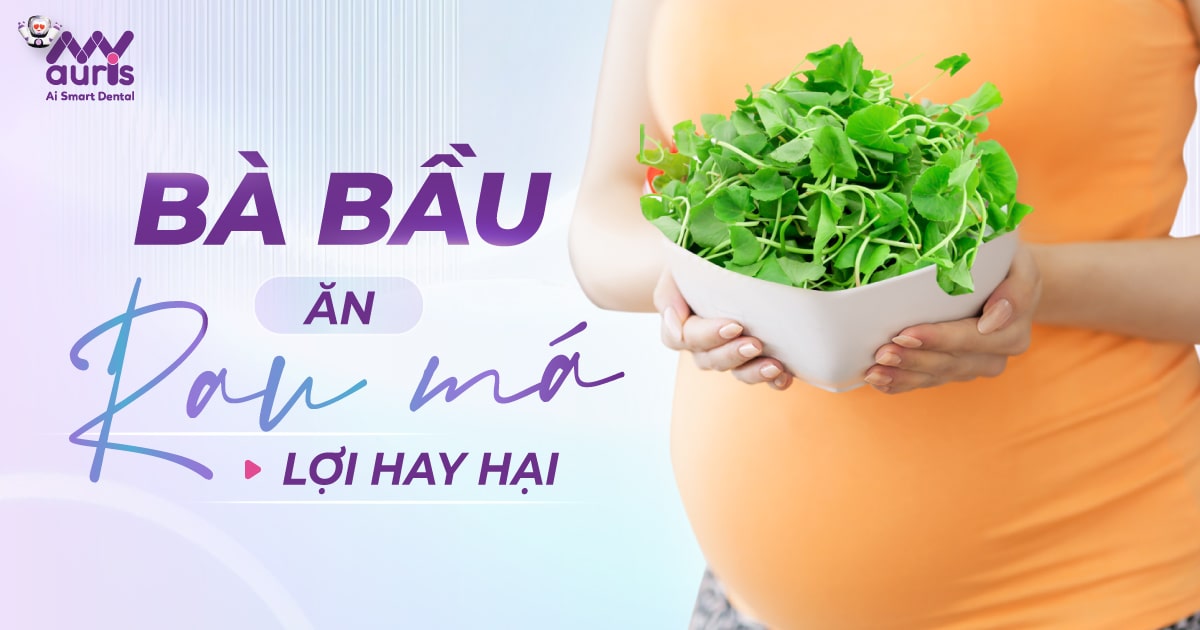Pennywort is a vegetable famous for its ability to cool the body. Many people wonder whether pregnant women can eat pennywort? Because pregnancy is inherently a sensitive time, everything the mother eats affects the baby, pennywort is no exception. To answer this question correctly, please refer to the following article, My Auris will help you get the most necessary information.
Answer: Can pregnant women eat pennywort?
Many people know that gotu kola has health benefits such as treating constipation, increasing blood flow, diuretic, reducing pimples, and cooling the body. Can pregnant women eat Gotu kola? Doctors say it is edible. However, you should be careful not to eat too much because Gotu kola is a cold food.

Pregnancy causes the metabolic rate in the mother’s body to increase, combined with hormonal changes Factors that often cause pregnant mothers’ body temperature to increase. Therefore, pregnant women can use pennywort to clear heat and detoxify the body. However, if you provide the body with a large amount of this vegetable, it will easily cause flatulence, bloating and, more dangerously, cause contractions in the uterus and lead to a high possibility of miscarriage.
Note that in the first 3 months of pregnancy, pennywort is on the list of vegetables that should not be used because of the high risk of causing miscarriage if eaten too much. Gotu kola also has cold properties that can easily cause poisoning and indigestion in the mother if pesticide residue remains. Therefore, to ensure safety, women who are less than 3 months pregnant should not use it, especially those with a history of miscarriage, miscarriage and difficulty maintaining pregnancy, etc.
From April, pregnant women with constipation can use 1 to 2 glasses of pennywort juice per week, which brings benefits such as diuretic, laxative and constipation treatment. good.
What are the benefits of eating pennywort for pregnant women?
Whether pregnant women can eat pennywort is not answered as quite good, as long as the mother eats it in moderate amounts and not too much, regularly to ensure diversity in the nutritional diet. Supports the body from nutritional imbalance or nutrient deficiency. When consumed properly, pennywort can bring the following health benefits to pregnant mothers:

- Helps reduce stress: If the mother is often stressed during pregnancy, when she gives birth, she will be at risk of delayed speech, hyperactivity and poor learning ability. Gotu kola contains the active ingredient triterpenoid – Helps improve nerve function and thereby prevent stress from occurring.
- Helps diuresis: Many people know Gotu kola as a medicinal herb that supports diuresis. Therefore, pregnant mothers can drink Gotu kola to relieve frequent urination during pregnancy or urinary retention due to pressure from the baby on the bladder. On the other hand, drinking or eating Gotu kola also helps reduce the absorption of harmful fats, reduces the risk of cardiovascular disease and helps eliminate toxins inside the body.
- Helps reduce fever due to mild colds: Centella asiatica itself has cooling properties, so when pregnant mothers use pennywort, it will actually reduce fever and cool down.
- Treatment of hemorrhoids: With hormonal changes during pregnancy, supporting the baby’s development is the reason why the mother’s digestive system slows down. This is the reason why pregnant mothers often suffer from constipation, which over time will develop into hemorrhoids. Drinking pennywort also helps the mother’s digestive system work better, thereby improving constipation during pregnancy pregnancy.
- Improves skin health: Gotu kola contains antioxidants that help slow down the aging process. Therefore, pregnant mothers should occasionally drink a glass of pennywort juice to help their skin become brighter and firmer.
- Wound healing: Gotu kola juice contains compounds that speed up cell healing, helping wounds heal faster than normal.
Pregnant mothers should eat gotu kola What is correct?
All for the sake of the mother’s health, whether pregnant women can eat pennywort will only be effective when supplemented properly. Therefore, when eating, mothers need to follow some of the following principles:

- Eat in moderate amounts: Mothers should not eat more than 240g of pennywort in a dayAt least, mothers should only eat about 200g of pennywort per day. Because, just 200g can provide 100% of the recommended iron and vitamin A content for pregnant mothers. Consuming too much iron and vitamin A will easily increase the risk of causing deformities in the baby and iron poisoning.
- Should be eaten alternately: Eating too much pennywort can cause the body to have a nutritional imbalance because of a lack of micronutrients from other foods. Therefore, to ensure diversity in the diet, mothers should only eat pennywort 1 to 2 times per week, and alternate combinations with many other vegetables to balance the micronutrients.
- Pay attention to food safety and hygiene: Because it is a vegetable that grows close to the ground with low foliage, pennywort is easily exposed to polluted water sources, dust, preservative chemicals, bacteria, and parasites that cause food poisoning. Therefore, before eating, mothers need to wash pennywort under water and soak the vegetables in diluted salt water or vinegar solution to disinfect. At the same time, when processing, mothers need to cook vegetables to ensure food safety.
- Should be prepared in a variety of ways: Gotu kola can be processed into many different dishes, from soup to stir-fry, porridge, etc. This will help diversify your diet and avoid feeling bored.
Some harmful effects when pregnant mothers eat pennywort improperly
If pregnant women can eat pennywort, they are encouraged to supplement it. However, pennywort, if not consumed properly, can cause some harmful effects:

- Eating pennywort of unknown origin: Exposes the mother to pesticides, preservatives or bacteria such as Salmonella, E. coli, Listeria – Causes blood infection and causes the fetus to have brain infection, affecting cognition in adulthood.
- Eating pennywort without washing: Causes the mother to suffer from poisoning and digestive disorders, leading to dangerous pregnancy complications.
- Eating too much: Although pennywort is considered a source of many nutrients for the body, eating too much can cause diarrhea, liver poisoning, fetal deformities,…
- Eating uncooked: Not only pennywort, raw vegetables in general are not safe for the mother, they have the risk of causing infection and heavy metals.
Above is information to answer the question of whether pregnant women can eat pennywort. Because pregnant mothers’ health will be quite sensitive and to avoid affecting the baby in the womb. You need to pay attention to the dosage when eating, avoid eating too much and wash and cook before eating. At the same time, it is necessary to diversify the menu every day with different types of vegetables and foods, to avoid loss of appetite and nutritional imbalance!
Yen Nhi





